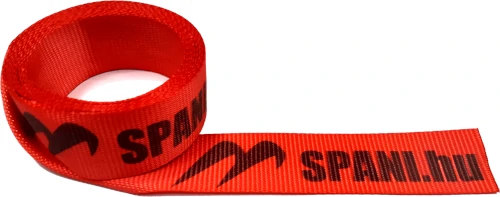Spanifer 5t 10m


RATCHET
• a short handle ratchet, with 250daN SHF value
• made of metal, more durable than market standard, thick surface treatment for long life
• handle with plastic coating for comfortable usage
WEBBING
• 50mm wide polyester, resistant to UV light with a breaking capacity of 75kN
 STRAP INSCRIPTION
STRAP INSCRIPTION
• inscription with a unique logo
• free of charge from 1000m
HOOK
• with a claw hook made of 12mm round bars at both ends
EN12195-2
• blue label in accordance with the regulation, sewn inside the belt hook to be protected against environmental impacts
QUALITY
• TÜV Rheinland tested, TÜV GS certified product
• the certificate number is indicated on the blue label
• quality is regularly checked using a calibrated tensile testing machine (Certificate No: AGK-167/2024)
Blue label
According to EN12195-2 every PES (polyester) made cargo control product must be supplied with an attached blue label. This label provides information about the technical details of the lashing strap and tracking information about the production time, location and producer. If the label is lost or become unreadable the product cannot be used any more. It also has a hidden part sewed into the lashing material, this way the necessary tracking information can be gained even after losing the visible blue label.
This indicates that there is a strict regulation about the content of the visible and non-visible part of the label.

Visible part
GS/TÜV certificate
It is not compulsory but good to have such a certificate for the lashing strap.
Material information
PES (polyester)
Applied European Norm
EN12195-2
Elongation
< 7%
SHF (standard hand force)
Hand operating force applied on the ratchet (50daN = ~50kg).
STF (standard tension force)
Residual force in the strap after release of the handle of the ratchet.
Lashing capacity (LC)
Maximum force for use in straight pull that a web lashing is designed to sustain is use. In addition usually the tie down capacity is also listed with LC marking, its value is double of the standard lashing capacity.
Length
Length of the long end given in meters.
Serial number
Provides tracking information about the production time, location and producer.
Production date
Warning
The lashing strap cannot be used for lifting, only for lashing!
Supplier or manufacturer mark
Name, symbol or registered trade mark of the manufacturer or supplier.
Non-visible part
Supplier or manufacturer mark
Name, symbol or registered trade mark of the manufacturer or supplier.
Lashing capacity (LC)
Maximum force for use in straight pull that a web lashing is designed to sustain is use.
Material information
PES (polyester)
Applied European Norm
EN12195-2
Serial number
Provides tracking information about the production time, location and producer.
Production date
White label
Contains the generale usage information - according to EN12195-2 - for the lashing strap:
- Inspect the lashings for damage before each use.
- Do not use if there are any damage e.g. cut webbing or deformations in the tensioning mechanism or and fittings.
- Observe the rated assembly strength on the label applied to the lashing mode (observe also EN 12195-1 and EN 12195-2).
- Use protectors for sharp edges (both on the load and the vehicle).
- Avoid heat superior to 100°C.
- Do not twist or knot the webbing.
- The ratchet can be operated only with the maximal allowed hand force.
LC
Maximum force for use in straight pull that a web lashing is designed to sustain in use. According to EN 12195-2 samples must be tested during the production. During the tests the complete lashing strap must sustain 2 x LC force, while the webbing must endure 3 x LC force.
LC tie down
The maximal tie down force affecting the load while the lashing strap sustains the maximum allowed force. The representation of this value is not regulated by EN12195-2, however common speech refer it as the capacity of the lashing strap. For example a "5 ton" lashing strap has an LC value of 2500daN and LC tie down value of 5000daN.
SHF (standard hand force)
Hand operating force applied on the ratchet (50daN = ~50kg). The handle has to be operated with this force to generate the standard tension force in the strap.
STF (standard tension force)
Residual force in the strap after release of the handle of the ratchet. The longer the ratchet is, the stronger force in the strap generated.

 Short
Short Normal
Normal ERGO
ERGO Long ERGO
Long ERGO






